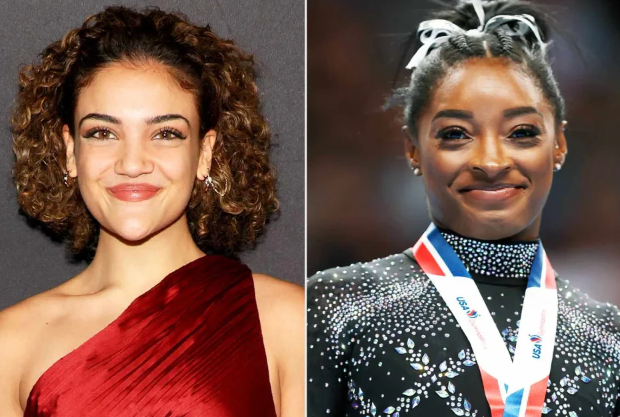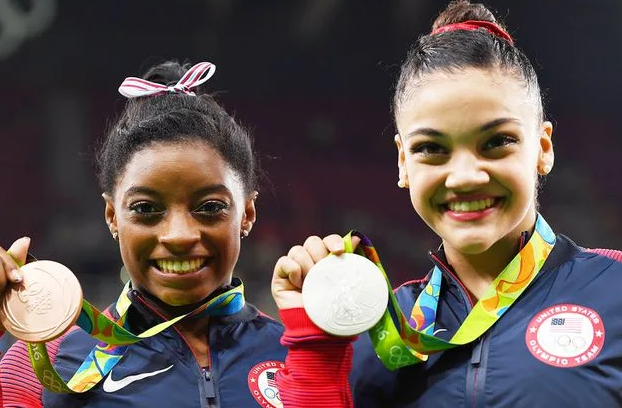Hernandez and Biles competed together at the 2016 Olympics in Rio
Simone Biles will always have her former Olympic teammate Laurie Hernandez in her corner.
The Paris 2024 hopeful, who just won her ninth U.S. Championship on June 2, will next tackle the U.S. Olympic Gymnastics Team Trials from June 27-30, and Hernandez is rooting for her the whole way.

“Simone is a big name that will always keep popping up,” Hernandez says of Biles, whom she competed alongside at the Rio de Janeiro Olympics in 2016. “She’s just a surefire for Team USA [in Paris], to know that she’s going to go out there and be consistent. Her difficulty is so high, and she really is one of the best. You can count on her. You know you’re going to watch greatness when her name pops up.”
If Biles makes the Olympic team, she’ll be the first American woman to make three Olympic gymnastics teams since Dominique Dawes. At the time of the Games, she’ll also be 27 years old, which in the gymnastics world, is “old,” Hernandez, 23, says with a bit of a smile.
“We’re so funny,” Hernandez, who recently partnered with Olay ahead of the Paris Games, adds, while acknowledging that many gymnasts don’t compete for as long as Biles has. “But this is a really exciting year.”
Biles herself addressed the discussion about her “old” age after her win on June 2, telling reporters, “I use the phrase ‘aging like fine wine.’ It’s just getting better and better. We’ll see. Hopefully we get to ride this out for the rest of the year.”

And seemingly, she is. She snatched gold medals in every apparatus at the competition: floor, vault, beam and uneven bars. She finished with a two-day total score of 119.750.
Biles admitted that she was learning to “trust” herself again following her performance at the Tokyo Olympics, where she pulled out of almost every event, later citing her mental health and the “twisties.”
“It took a lot mentally and physically to just trust my gymnastics again and most importantly trust myself,” she said during her press conference. “I think that was the hardest part after Tokyo is I didn’t trust myself to do gymnastics.”
Biles will aim for her third Olympic team at the trials, which take place in Minneapolis. Hernandez will also be in Paris for the Olympics as an NBC correspondent for gymnastics, a gig she tells PEOPLE she’s “excited” for but a little nervous about.
“I just want to share my joy with the sport with everyone,” she says.
Three years after gymnastics superstar Simone Biles put the mental health of athletes centre stage at the Tokyo Olympics, this year’s Paris Games will demonstrate how greater awareness has translated into better care and support.
Biles famously pulled out of most of her events in Tokyo mid-Games after struggling with mental health problems and the “twisties” — a disorienting feeling while in mid-air that is known to affect some gymnasts.
In the run-up to the start of Paris 2024 on July 26, local organisers, the International Olympic Committee (IOC) and international sports federations have been keen to stress that lessons have been learned.
“Seventy percent of Olympians only get one Olympic experience. We want to try and make sure this is the best experience they could possibly have,” Head of Safe Sport at the IOC, Kirsty Burrows, told AFP.
For the first time ever at an Olympics, competitors in Paris will have access to a “mindfulness and relaxation area” above the main gym in the village, called the “365 Athlete365 Mind Zone”.
Competitors will be offered virtual reality headsets for meditation, sleep pods, and even art activities, all in a low-lighting environment designed to be soothing and quiet.
“It’ll be very zen, like a futuristic spa,” Burrows added.
Also in the village, athletes will have an alcohol-free bar and social areas to help them kick back, as well as guides on how to maintain good mental hygiene by avoiding too much time on screens.
“In the same way that no athlete would think of stuffing themselves with burgers and sweets before a competition, it’s not good to stuff yourself with videos on social networks by binge-watching TikTok or Instagram,” Paris 2024 health coordinator Laurent Dalard told reporters in March.
A mental health helpline in 70 languages will also be available to all Olympic and Paralympic athletes.
Around 90 national sporting teams will bring their own mental health welfare officers, using a new type of Games accreditation which has only been available since the Beijing Winter Olympics in 2022, Burrows said.
– Taboo busting –
Research suggests that elite sports people suffer from mental health disorders in around the same proportions as the general population, experts say.
But Dalard stressed that they were “more vulnerable to situations such as anxiety disorders or depression, given their complicated lives and the intense pressure they face.”
According to Marion Leboyer, a psychiatrist and founder of FondaMental, a French research foundation, “around one athlete in three experiences symptoms of a mental health problem.”
Long a taboo subject, many of them are now opening up about their struggles thanks to the revelations of stars such as Biles, Japanese tennis player Naomi Osaka or Australian swimmer Ian Thorpe.
That has trickled down into lesser-known sports.
Slovenian champion rock climber Janja Garnbret, who won gold at the Tokyo Olympics, has denounced the problem of anorexia in the climbing community where being lightweight is an advantage.
“Do we want to raise the next generation of skeletons? Brittle hair, dull expressions, trying to show everyone you are ok but are you really?” she asked in an Instagram post last July.
Under pressure, the International Climbing Federation announced health checks for competitors to help identify at-risk climbers.
More recently in host nation France, multi-gold medallist Marie-Jose Perec revealed more about her shock decision to abandon the Sydney Olympics in 2000.
“Everyone could see that things weren’t ok, but no-one understood,” the sprinter told the Tribune newspaper.
Her departure garnered little sympathy in Australia where one national newspaper dubbed her “Mademoiselle la chicken” on its front page.
– Trolls beware –
Paris 2024 will also see efforts to counter cyber-harassment and bullying taken to new AI-powered levels.
“I’m really pleased about the cybersecurity stuff around social media and athletes being trolled,” Alan Currie, a British psychiatrist who advises the IOC, told AFP. “That’s a huge step forward because that’s a real pressure point for athletes.”
Following the example of FIFA, World Rugby and some Premier League football clubs, the IOC will team up with London-based data company Signify.ai to weed out abusive posts among the billions expected during the Games.
Signify uses artificial intelligence to monitor messages addressed to athletes on platforms such as Facebook, TikTok or X (formerly Twitter) in 35 languages, flagging potential harassment or threats.
“Anything that breaches the criminal code will be sent to law enforcement,” Burrows said.
All 15,000 athletes at the Olympics and Paralympics will be offered the service, which will be on an opt-in basis.